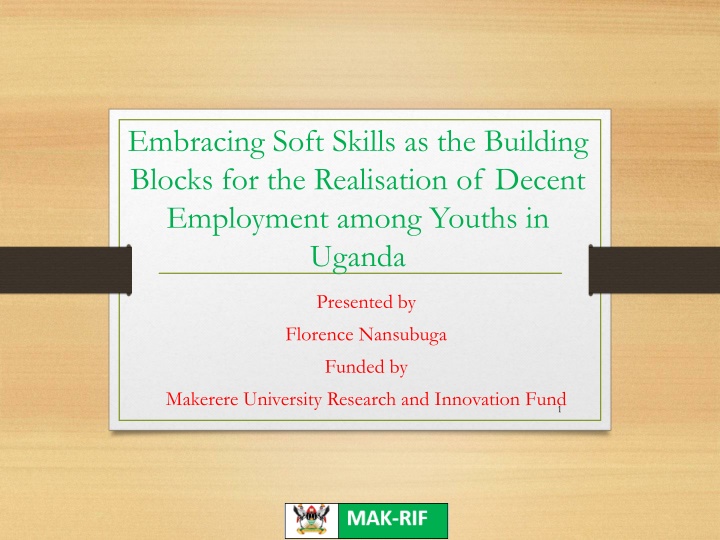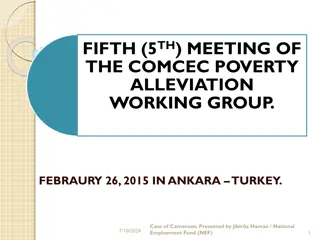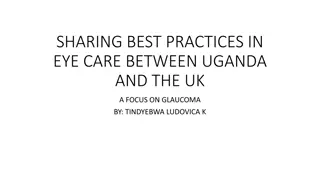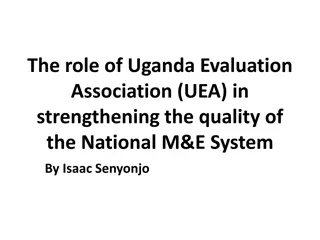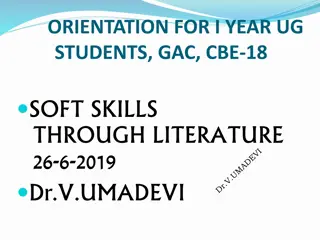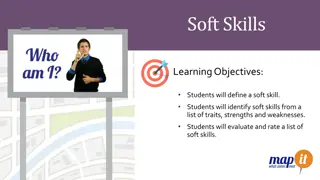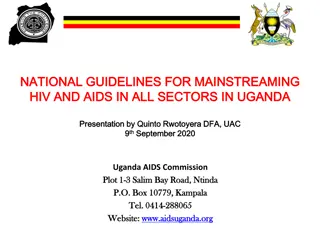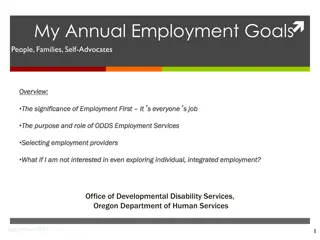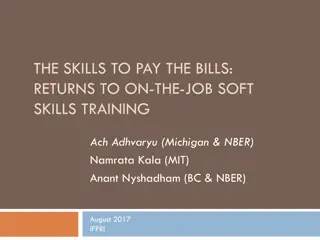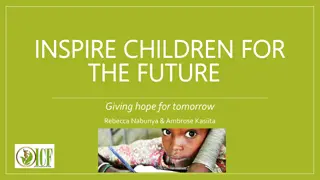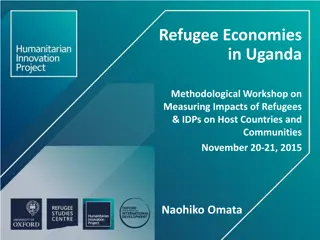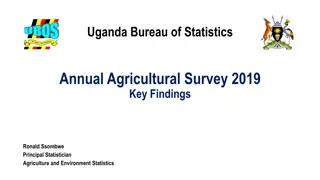Embracing Soft Skills for Youth Employment in Uganda
Understanding the importance of soft skills in achieving decent employment for Ugandan youths. The research explores the skills gap, challenges in acquiring soft skills, and the impact on job prospects. Recommendations aim to enhance the educational system to better prepare graduates for the workforce.
Download Presentation

Please find below an Image/Link to download the presentation.
The content on the website is provided AS IS for your information and personal use only. It may not be sold, licensed, or shared on other websites without obtaining consent from the author.If you encounter any issues during the download, it is possible that the publisher has removed the file from their server.
You are allowed to download the files provided on this website for personal or commercial use, subject to the condition that they are used lawfully. All files are the property of their respective owners.
The content on the website is provided AS IS for your information and personal use only. It may not be sold, licensed, or shared on other websites without obtaining consent from the author.
E N D
Presentation Transcript
Embracing Soft Skills as the Building Blocks for the Realisation of Decent Employment among Youths in Uganda Presented by Florence Nansubuga Funded by Makerere University Research and Innovation Fund 1
RESEARCH TEAM DR FLORENCE NANSUBUGA - PRINCIPAL INVESTIGATOR DR MARTIN BALUKU - CO-INVESTIGATOR DR SIMON NANTAMU - CO-INVESTIGATOR ASSOC. PROF GRACE KIBANJA- CO-INVESTIGATOR MR VINCENT MUWONGE - CO-INVESTIGATOR 2
Structure The presentation has been divided into the following sections; 1. Background 2. Problem 3. Objective 4. Conceptual and theoretical framework 5. Methodology 6. Findings. 7. Conclusion 8. Recommendations. 3
BACKGROUND The education system has created a belief among the youths that obtaining good academic grades will automatically lead you to descent formal employment (Holt and Neely, 2011). 30% of the 70% unemployed youth in Uganda are graduates (Magelah and Ntambirweki-Karugonjo, 2014). 400,000 graduates are released annually into the job market to compete for approximately 9,000 available formal jobs (Magelah and Ntambirweki-Karugonjo, 2014 4
BACKGROUND Even the vocational institutions are producing office workers rather than job creators (Garcia, 2014; Heckman and Kautz, 2012). These youths have entered into jobs with precarious conditions as long as it can offer formal employment. Decent jobs demands for multiple skills that are associated with the youths full development These skills include a combination of soft skills (non-cognitive skills) and hard skills (cognitive and technical skills). Soft skills have a high predictive power for the youth s career success and in particular for decent life. 5
PROBLEM There are various relationship challenges linked to soft skills at the workplace that affect decent work. Often people do not get along and they are not ready to change their undesired habits. This creates a situation where expressing one s rights and /or participating in decisions that offer decent work life becomes extremely difficult. Nonetheless, there is insufficient research on the development of soft skills, both in policy and institutional contexts. 6
PURPOSE AND OBJECTIVES The study examined the skills gap created by the absence of soft skills in the current education system and how this impacts on decent employment among the graduate youths in Uganda. Objectives 1. To examine personality traits that influence desired soft skills 2. To establish soft skills that influence critical thinking as measure of success . 3. To establish soft skills that influence academic and job success among youth 4. To establish soft skills that best predict decent employment 7
OCEAN Model OCEAN is an acronym for the big five personalities i.e. Openness to experience, Conscientiousness, Extraversion, Agreeableness and Neuroticism/emotional stability (Costa and McCrae, 1992). 9
OCEAN Model Personality factor Definition Associated soft skills Openness to experience The tendency to be open to new aesthetic, cultural, or intellectual experiences creativity, developing new ideas and flexibility Conscientiousness The tendency to be hardworking and organized Grit, Perseverance, achievement striving, self-discipline, deliberation positive affect, warmth and sociability Extraversion Orientation of one's interests and energies toward the outer world of people and things The tendency to act in a cooperative and unselfish manner Agreeableness straight forwardness, compliance and sympathy. Self-esteem, Self-efficacy, Optimistic, Calm, Confident, Resilient Emotional stability The tendency to be predictablele, self-conscious and consistentt in emotional reactions with absence of rapid mood changes 10
SOFT SKILLS Soft skills are personal attributes and behaviours (non-cognitive) that stimulate positive interpersonal and intrapersonal relations (Kautz, et al., 2014). Soft skills have been found to be essential predictors of success in various life domains; be it academics, job performance, business or politics, etc. (Holzer, 1997). In this study we identified nine soft skills from literature that are key to life domains. These are, grit, self-efficacy, leadership, assertiveness, teamwork, time management, communication, networking and negotiation. Definitions of selected soft skills.docx 11
CRITICAL THINKING Critical thinking is a cognitive skill and our measure for success (DV) According to Facione et al., (2000) critical thinking is an index for success in both academic and job performance 12
DECENT WORK/EMPLOYMENT Decent employment is associated with the availability of employment in conditions of freedom of expression, equity, security, better prospects for personal development. human dignity and all aspects that people aspire in their working lives (Zu, 2013). 13
HYPOTHESES 1. There is a significant relationship between soft skills critical thinking 2. Soft skills significantly predict decent employment among the formal employed and the self-employed youth 3. The mean scores for each soft skill differ significantly among the four study groups. 4. There is a significant difference between the perceived soft skills of female and male youths 14
METHODOLOGY Longitudinal quasi experimental design with a training intervention, For this baseline study, we have adopted a causal-correlation and exploratory designs A sample of 722 graduate youths from Kampala, Entebbe, Wakiso, Entebbe, Mukono, Yumbe, Kasese, Soroti and Mbale. The formal employed youth (FEY) 17.3%, the self-employed youth (SEY) 22.2%, the youth in school (YIS) 41.3% and the unemployed youth (UEY) 19.2%. The instruments were adopted from the previous research works and validated through a pilot survey We used EFA, CFA, Pearson correlation coefficients, Anova with Turkey Lewis post hoc and both multiple and hierarchical regression to analyze data. 15
FINDINGS 16
CORRELATION BETWEEN PERSONALITY FACTORS AND SOFT SKILLS 17
Grit Self-efficacy Leadership Harmonious assert Openness to experience Teamwork Time management Networking Collaborative negotiation 18
Grit Self-efficacy All forms of assertiveness Teamwork Conscientiousness Time management Networking Collaborative negotiation Compromising negotiation Avoidance negotiation 19
Grit Aggressive assertive Extraversion Networking Competitive negotiation 20
Grit All forms of assertive Teamwork Agreeableness Networking Communication Collaborative negotiation Accommodative negotiation Compromising negotiation 21
Self-efficacy Passive assertive Harmonious assert Teamwork Emotional stability Networking Negative with all negotiation components 22
Soft skills with the highest impact on critical thinking Among the YIS teamwork (r=.50**) impacted highly on critical thinking followed by time management (r=.38**). Among the FEY teamwork (r=.61**) impacted highly on critical thinking, followed by time management (r=.49**). Among the SEY manipulative assertive (r=.37**) impacted highly on critical thinking, followed by self-efficacy (r=.34**). Manipulative assertiveness behaviour is however discouraged because it founded on dishonest, the vendor often plays a role of a victim to gain sympathy or to cheat customer and if people find out the relationship may be destroyed The most effective is harmonious assertiveness where the individual attempts to be attempt to be honest, self-respecting, self-expressive and straight forward (Moon, 2009). 23
Best predictors of Decent employment Among the FEY, networking skills( = .29**) was the best predictor of decent employment, followed by communication skills( = .29**), while income contributed ( = .23*). The regression model accounted for 34% of the variance in decent employment (p<.01). Among the SEY, self-efficacy ( = .35**) was the best predictor followed by time management ( = .29**) and then leadership skills ( = .18**). The model explained 41% of the variance in decent employment (p<.01). 24
Soft skills percentage scores for each study group SOFT SKILLS FEY H GRIT 68% 39% 38% 62% 52% 48% 70% 30% SELF-EFFICACY 47% 53% 33% 67% 49% 51% 50% 50% LEADERSHIP 10% 90% 10% 90% 12% 88% HARMONIOUS ASSERTIVE TEAMWORK 75% 25% 66% 34% 63% 37% 83% 17% TIME MANAGEMENT 70% 30% 47% 53% 68% 32% 78% 22% COMMUNICATION 35% 65% 42% 58% 37% 63% 39% 61% NETWORKING 49% 51% 27% 73% 48% 52% 49% 51% COLLABORATIVE NEGOTIATION SEY H YIS H UEY H L L L L 75% 25% 69% 31% 44% 66% 05% 95% 65% 35% 43% 57% 47% 53% 60% 40% 25
Difference in group mean scores Variables with p <.05 Higher mean Size Lower mean df F Eta ( ) .09 Grit FEY & UEY SEY &YIS 3 24.44** M Self-efficacy FEY & UEY SEY &YIS 3 45.57** .16 L Harmonious assert FEY & SEY YIS* & UEY* 3 141.50** .37 L Teamwork FEY & UEY SEY &YIS 3 4.74** .02 S M Time management FEY & UEY SEY &YIS 3 26.49** .10 Networking FEY & UEY SEY &YIS S 3 5.11** .02 Collaborate negotiation FEY & UEY SEY &YIS L 3 72.60** .23 Critical thinking FEY, SEY & YIS UEY 3 53.88** .18 L *the two groups still have different means, UEY having the lowest On most soft skills there was no significant difference between the mean sores of FEY and UEY The mean score of UEY was very different from the mean scores of other groups Eta squared of .01 and <.06 is small, .06 and < .14 is medium, and .14 is large (Cohen,1988) 26
IMPLICATIONS AND CONCLUSIONS 27
Contribution of Personality Soft skills are not personality specific; each soft skill is influenced by several personality factors. The variances explained by the personality factors in the soft skills are in small to moderate percentages (ranging from 10% to 44%). This implies that the remaining contribution is based on other factors particulary the social learning (i.e. learning from others including training programs) 28
Contribution of Grit (perseverance, persistent, passion, determination) We found grit to be a significantly predictor academic success among the youths in school and business success among self- employed youths. However majority of the self-employed youths (62%) scored low on grit and among the youth in school a reasonable number of 48% also scored low These results gives evidence on the deficiency level of grit and the need to develop this soft skill in academic programs 29
Contribution of self-efficacy (confidence, commitment, optimism) We found self efficacy to be very useful for youth, especially those venturing into entrepreneurship (self-employed) It is one of the best predictor of decent work both in formal and self-employment However majority of the youth in all groups scored low on self efficacy (i.e. FEY = 53%, SEY = 67%, YIS = 51%) We conclude that activities related to building youths confidence, resilience and enthusiasm to deliver long term goals could be missing in the academic programs 30
Contribution of leadership skills (the art of motivating others) Leadership is one of the best predictors of decent work, particularly among the self-employed youth. One need to inspire others to achieve short and long term goals regales of the hardships. Nonetheless, the youth is all groups scored very low on leadership skills i.e. FEY (90%), SEY (90%) YIS (88%) In conclusion, leadership is key to decent work concerns such as freedom of expression, equity, security, human dignity and other workplace conditions. The low levels of leadership skills not only among the youths could be the cause of chaotic relationships at the workplace and national wide. 31
Contribution of harmonious assertive (defend own rights and others rights) Harmonious assertive proved to be associated with success (academic and job), Because of the interrelationship nature of harmonious assertive, individuals are able to relay to each other during task performance and consequently becomes fundamental for critical thinking. Unfortunately 66% of the youths in skills scored low on harmonious assertive, implying that this soft skill is not effectively developed. 32
Contributions of teamwork (dedication, cooperation, interdependence, coordination) We found teamwork to be one of the best predictors for both academic and job success as well for decent work/employment. One average, over 60% of the youths we studied in all groups expressed having a high level of teamwork behaviour This may mean that possibly teamwork is one of the soft skills that has been paid attention to by the trainers/mentors in school and at the workplace 33
Contributions of time management (targeting, prioritizing and allocating time) We also found time management to be one of the best predictors for both academic and job success as well for decent work/employment. One average, over 60% of the youths formal employment and youths in school scored high on time management However 53% of the youth in self-employment scored low on time management, This denotes that majority of youth in self-employment have challenges with setting business targets, prioritizing activities and allocating time to tasks (generally planning and organizing). 34
Contribution of communication skills (articulate, comprehensive, coherent) We found communication skills to be one of the best predictors of decent work/employment among the youth in formal employment. However we also found 68% of the youth in formal employment scoring low on communication skills This suggests that many of the decent work concerns are a result of poor communication skills. Possibly the youth are not able or they are not allowed to express their concerns and participate in the decisions that affect their lives (Zu, 2013). 35
Contributions of networking (connections, ties or bridges across people and groups) Networking was found to be the best predictor of decent employment among the formal employment and it is strongly correlated with critical thinking ( measure of success) among youths in all groups However majority of the youths in all groups scored low on networking (over 50% and 73% of the self-employed youth) The youths who cannot developing and maintaining personal relationships(networks) are also unable to take advantage of decent work opportunities (Forret and Dougherty, 2001). 36
Contributions of collaborative negotiation (constructive, fair agreement, win-win situation) Collaborative negotiation was found to be significantly associated to academic and job success among youths all groups However majority of the youths in self-employment (57%) and the youth in school (53%) scored low on collaborative negotiation. Although collaborative negotiation is not directly linked to decent work, it helps individual to solving problems that may hinder academic, job or business success Therefore developing collaborative negotiation skills among the youth is critical 37
Gender difference on soft skills Among the youth in formal employment, the mean score of the female youths (M=3.19) was significantly different from the mean score of male youths (M=3.56) on networking skills (t=2.46, p<0.05) Among the youth in in school, the mean score of the female youths (M=3.39) was significantly different from the mean score of male youths (M=3.68) on grit (t=2.46, p<0.05) Among the youths in self-employed youths, we did not find significant difference in the mean scores of female and male youths on any of soft skills 38
RECOMMENDATIONS Managers and trainers and employers to integrate methods and activities that promote soft skills in their training and assessment programs. Policy making institutions and regulators in the field of education, employment and social development to formulate clear guidelines that will help trainers and employers to track their performance in terms developing soft skills that address decent work concerns. 39
